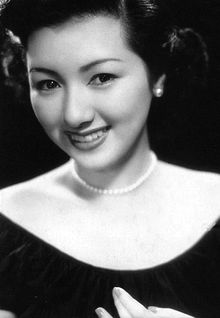Hideko Takamine
Hideko Takamine | |
|---|---|
 Hideko Takamine | |
| Years active | 1929 – 2010 |
| Spouse | Zenzo Matsuyama (1955-2010) |
| Awards | Japan Academy Prize Lifetime Achievement Award 1996 Mainichi Film Concours Best Actress 1962 Happiness of Us Alone 1958 Times of Joy and Sorrow 1956 Floating Clouds 1955 Twenty-Four Eyes |
Hideko Takamine (高峰 秀子, Takamine Hideko, March 27, 1924– December 28, 2010) was a Japanese actress who began as a child actor and maintained her fame in a career that spanned nine decades.
Life and career

Born in Hakodate, Hokkaidō, Japan, Takamine's first role was in the Shochiku studio's 1929 film Mother (Haha), which brought her tremendous popularity as a child actor. Soon she was billed as Japan's Shirley Temple. After moving to Toho in 1937, her dramatic roles in Kajirō Yamamoto's Tsuzurikata kyōshitsu and Uma brought her added fame as a girl star.[1] Some of her film appearances from the 1930s and 1940s were lost during the Second World War when Japan's film archives suffered from bombing and fires.
In 1950, she made what was considered a very daring move by breaking with the Japanese studio system, leaving the Shin Toho Studio and becoming a much sought-after freelance actress. Her films with directors Keisuke Kinoshita and Mikio Naruse during the 1950s and early 1960s made her Japan's top star. Her performance as a dedicated small town teacher observing her students' lives over several decades in Kinoshita's The Twenty-four Eyes (1954) is credited with that film's tremendous success and enduring popularity in Japan. Another powerful performance was as a tenant farmer's daughter who is raped and forced to marry the cruel landlord's crippled son in Immortal Love (1961).
Takamine was especially favored by director Mikio Naruse, starring in a dozen of his films and portraying strong-willed, hardworking women struggling in poverty or lowly positions, and often held down by the traditional family system. Some of her more moving roles include the tragic, love-struck heroine in Floating Clouds (1955) and an aging Ginza bar hostess desperate to escape her circumstances in When a Woman Ascends the Stairs (1960). Naruse was shy, few of his closest collaborators knew him well and Hideko Takamine remembered - "Even during the shooting of a picture, he would never say if anything was good, or bad, interesting or trite. He was a completely unresponsive director. I appeared in about 20 of his films, and yet there was never an instance in which he gave me any acting instructions.'[2]
She married director-writer Zenzo Matsuyama in 1955, but set a precedent by choosing not to give up her acting career. She made many of her most memorable films in the 1960s and retired from making movies in 1979.
After retiring as an actress, she gained renown as a witty essayist.[1] She died of lung cancer on 28 December 2010 at the age of 86.[1]
Filmography
(incomplete)
- Tokyo Chorus (東京の合唱 Tokyo no kōrasu) (1931)
- Hideko the Bus-Conductor (Hideko no shasho-san) (1941)
- Ahen senso (阿片戦争) (1943)
- Those Who Make Tomorrow (明日を作る人々, Asu o tsukuru hitobito) (1946)
- (銀座カンカン娘 Ginza kankan musume) (1949)
- The Munekata Sisters (Munekata kyoudai) (1950)
- Carmen Comes Home (カルメン故郷に帰る, Karumen kokyō ni kaeru) (1951)
- Lightning (稲妻 Inazuma) (1952)
- Entotsu no mieru basho (1953)
- Twenty-four Eyes (Nijū-shi no hitomi) (1954)
- Floating Clouds (Ukigumo) (1955)
- Flowing (Nagareru) (1956)
- A Wife's Heart (Tsuma no kokoro) (1956)
- Untamed Woman (Arakure) (1957)
- (喜びも悲しみも幾歳月 第一部第二部 Yorokobi mo kanashimi mo ikutoshitsuki) aka The Lighthouse or Times of Joy and Sorrow or Years of Joy and Sorrow (1957)
- When a Woman Ascends the Stairs (Onna ga kaidan o agaru toki) (1960)
- Daughters, Wives and a Mother (Musume tsuma haha) (1960)
- Immortal Love (Eien no hito) (1961)
- A Woman's Life (Onna no rekishi) (1963)
- Yearning (Midareru) (1964)
References
- ^ a b c "Actress Hideko Takamine dies at age 86". Japan Today. 1 January 2011. Retrieved 31 December 2010.
- ^ ' A dose of reality' article in 'the independent' 29 june 2007
External links
- University of Waterloo, Spring 1994 KINEMA profile
- San Francisco Chronicle, "Director Mikio Naruse retrospective takes insightful plunge into a postwar Japan in flux", December 28, 2005.
- Hideko Takamine at IMDb
- Hideko Takamine at the Japanese Movie Database (in Japanese)
